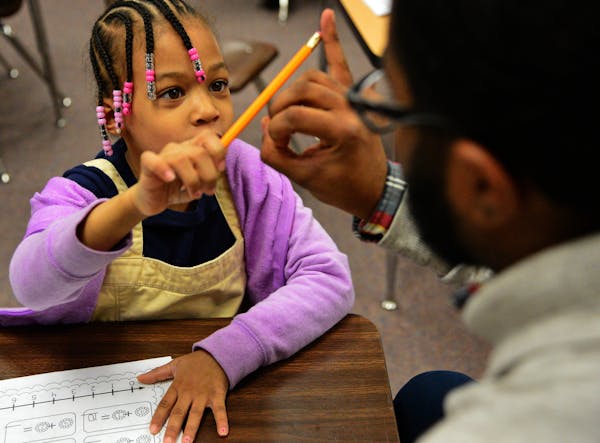Washington – The U.S. Department of Education has committed $26 million to a program designed to improve the lives of children and families in north Minneapolis, but halfway through the initiative, the federal government has no plan to evaluate its effectiveness.
The Northside Achievement Zone is an ambitious, five-year plan to provide cradle-to-college services for north Minneapolis, one of the most distressed, high-poverty neighborhoods in the state. One of the "Promise Neighborhood" programs created around the country in 2010, it's aimed at helping families with everything from preschool and housing to health care and career counseling.
But the Government Accountability Office, Congress' watchdog agency, says the Education Department has failed to develop ways of determining whether the multimillion-dollar program and others like it are on track to achieve their goals.
The Education Department has been collecting large amounts of data from the programs for use in evaluating them, an agency report said, but the offices responsible for program evaluation "have not yet determined whether or how they will evaluate the program."
Minneapolis Mayor Betsy Hodges, who is a director on the Northside Achievement Zone's board, said the program is a national model for "effective strategies for eliminating racial and place-based disparities." Minneapolis hosted a training session last week for those running similar programs in three California cities — Los Angeles, Chula Vista and San Francisco — and Indianola, a city in the Mississippi Delta.
Education Department officials say they have received reports on promising results from around the country, but acknowledge they do not have a plan to assess the data's reliability. They blame funding cuts from federal sequestration that they say left them short on resources.
Republican Minnesota U.S. Rep. John Kline, chairman of the House Education Committee, requested the review of the Obama administration initiative nearly a year ago, questioning whether the program is "more effective than duplicative or overlapping programs run by other federal agencies." Agency staffers visited 11 such Promise programs across the country for its report, but not the Northside Achievement Zone.
Promise Neighborhood program backers said it's too early to deliver a definitive verdict.
"This report came out only in the second year of implementation," said Michael McAfee, director of the Promise Neighborhoods Institute at PolicyLink, a national think tank focused on social equity. "I don't know of anybody who would do a national evaluation two years into a 20-year journey."
Vantage point
The Northside Achievement Zone covers a square-mile area of north Minneapolis where 90 percent of children live in poverty and have some of the lowest test scores and graduation rates in the state.
To change those outcomes, the zone's 70-person staff serves 625 families and 1,500 children, with plans to reach 1,000 families and 2,250 children by the end of 2015. In addition to helping families gain access to basic services, the program employs academic coaches to track student attendance, grades and homework assignments, while nudging parents toward greater involvement.
Tracking data through the end of 2013, a study by the Amherst H. Wilder Foundation found that one-third of enrolled families who faced homelessness or high mobility found stable housing and 46 percent of unemployed adults who sought help finding work found jobs. The study also found that participating families were three times as likely to enroll their children in child care or preschool. Test results from the nine public and charter schools in the zone show that 60 percent of children enrolled in the Promise Neighborhood programs were academically prepared for kindergarten, compared to 35 percent across north Minneapolis.
The program "has put us in a position to really understand the solutions that are needed and whether they're working," said Michelle Martin, chief operating officer of the Northside Achievement Zone.
North Minneapolis residents Shannen Brown and Amy Suchie have six children benefiting from the Promise Neighborhood, from child care for a 3-year-old daughter to in-school mentors and summer activities for their teenage son. Plagued by medical problems, the couple said the aid they've received in keeping their children connected in the classroom is testament to its effectiveness.
"Once it catches on, people will really start believing," Brown said.
Across the river
The St. Paul Promise Neighborhood won a $500,000 "Promise Neighborhood" planning grant in 2010 to provide services in a square-mile area in the Frogtown and Summit-University neighborhoods.
Since then, the program has offered summer-school classes, after-school tutoring, rental assistance and hired staff that help families find work, housing and child care.
The government agency report criticizes the Education Department for such programs in the dark about their chances of winning an implementation grant. The watchdog report also faulted the Education Department for failing to set goals to keep the initiative alive without federal funding.
After twice failing to secure a multimillion-dollar implementation grant like Minneapolis, St. Paul's program has survived primarily on private and state funds.
"Our plan was intentionally built so that if we didn't get it, there'd be pieces we could do without that surge of federal dollars," said director Muneer Karcher-Ramos.
Once the federal funds run dry, PolicyLink aims to help the Promise Neighborhood leaders in Minnesota and elsewhere pick up private support. For that to happen, the initiative needs to produce results now, McAfee said.
"If we're using public dollars, we darn well better be able to articulate the results for that investment," he said. "If we're not delivering, we don't believe we deserve a dime."
Corey Mitchell is a correspondent in the Star Tribune Washington Bureau. Twitter: @C_C_Mitchell
Officials say man shot 2 months ago in vacant downtown Minneapolis triplex was victim of homicide

Official who helped MSHSL on pioneering ventures dies at 89

Buy Nothing meets GoFundMe: How a Eden Prairie website aims to 'revolutionize' philanthropy

